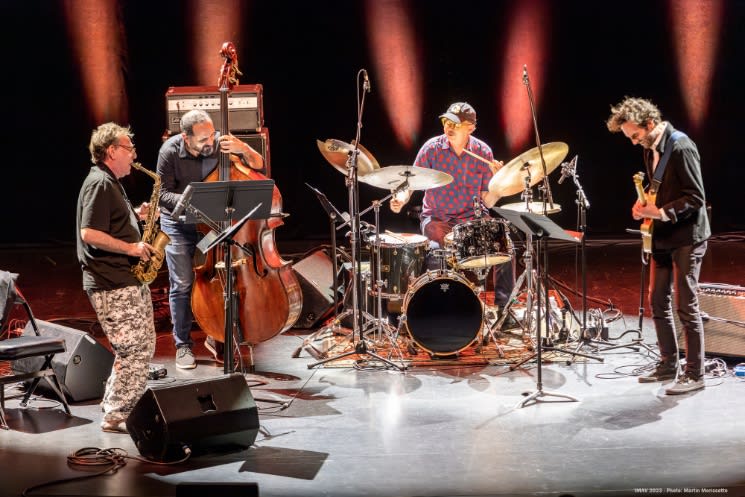Though the COVID masks were mostly history and the advertised slate of artists were all in attendance, the lead up to this year's FIMAV was still not without its hiccups.
The first came with the loss of Colisée Desjardins, one of the festival's key venues and home to nearly half of its concerts. The second came with the announced retirement of Michel Levasseur, the festival's founder and artistic director. Anyone who has attended FIMAV is familiar with Levasseur, who personally introduces every performance with the modest good humour of someone who is genuinely a fan of new musical experiences.
The issue of venues was resolved by the festival taking full advantage of the two main theatre spaces in the city's Le Carré 150 and turning a hotel conference room into a music venue without missing a beat or sacrificing any of the festival's programming or integrity. The issue of the festival's operational future remains uncertain, with Levasseur's wife and administrative director, Joane Vézina, joining him in retirement. The "family affair" aspect of the event always balanced out its grandeur, giving it a human touch and easy feeling that seemed unlikely given the stature of its performers.
Though the melancholic mood touched performances, the lineup was stellar as usual. Appropriately enough, longtime festival titans Fred Frith and John Zorn both made appearances. The balance of veteran performers and relative newcomers, of local talent and international guests, remained a hallmark.
May 18
PoiL Ueda
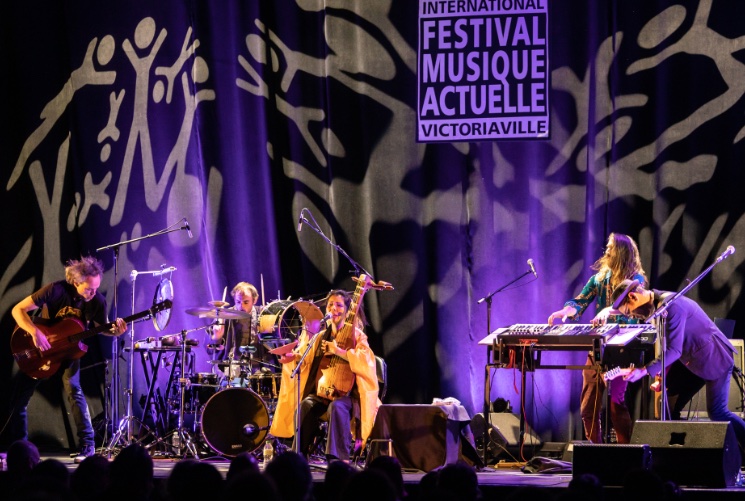
French quartet PoiL play a brand of progressive rock that incorporates metal gestures and technical dexterity, tempering their impressive heaviness with multidimensional articulation. The group recently added another dimension via collaboration with Japanese singer and satsuma-biwa player Junko Ueda. Their festival opening concert featured a cycle of epic 13th century Japanese stories of samurai and wartime family battles. With Junko's guidance and featured vocal presence, the group threaded their operatic aggression with delicate acculturation of Eastern sounds and modes. Notably, keyboardist Antoine Arnera not only carried much of the melodic weight of the pieces, but also featured an array of tones that bridged the distance between traditions. It was a blistering start to the festival, and one that would be difficult to top.
Ikue Mori
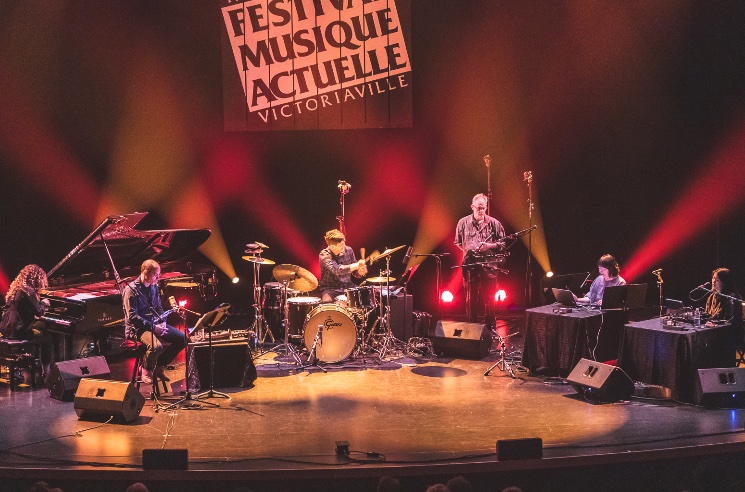
Festival veteran Ikue Mori brought her new suite of compositions entitled Tracing the Magic, released last June on John Zorn's Tzadik label, to the stage in Victoriaville. More boldly musical than in previous iterations, Ikue's digital contributions were rounded out by a strong team of veteran players, particularly vocal improviser Charmaine Lee who early on combined with Ikue for an ASMR-like sequence of quiet ticks and whispers. As the performance progressed however, it seemed like the compositions were imposing more limitations than opening possibilities. While versatile woodwind player Ned Rothenberg managed clever and affecting interplay with Lee and drummer Ches Smith, pianist Sylvie Courvoisier never seemed to find a seam to slip into, and David Watson spent long stretches quietly holding rather than playing his bagpipes. It was a performance dotted with fine moments, but never really found the magic.
May 19
Emilie Škrijelj / Tom Malmendier
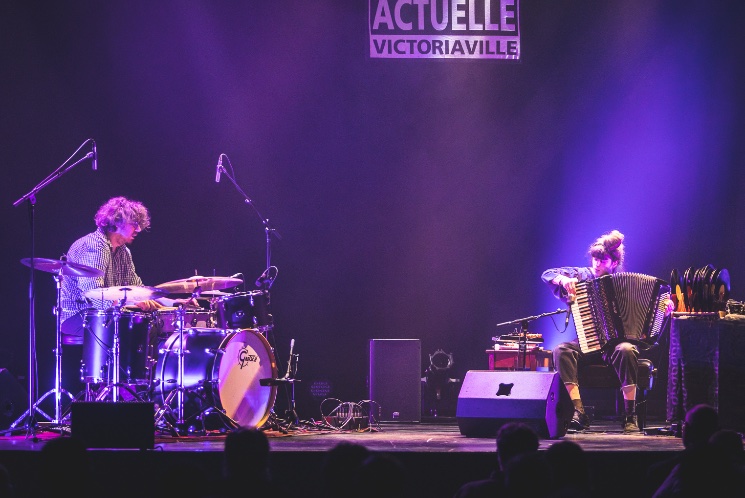
If seeing Emilie Škrijelj's accordion sitting on the stage created a kind of Chekov's Gun expectation, this was the kind of show where that gun would be used to crack walnuts in the third act. Starting with a loop-laden suite of noises courtesy of turntable and electronics, Škrijelj and drummer Tom Malmendier maintained a pocket of tension and detail that found them creatively locked together within a constantly surprising mechanism. By the time the accordion was retrieved from its resting place, it became clear that, instead of polka standards, the instrument would be used as a kind of resonant chamber and percussive surface channelled through more electronics that unlocked many hidden avenues of tone and rhythm. Škrijelj and Malmendier's great strength lies in their easily shared musical grammar, dissolving the tendency of lead and support in favour of truly inspired co-creation.
Joe Sorbara / Matthias Mainz
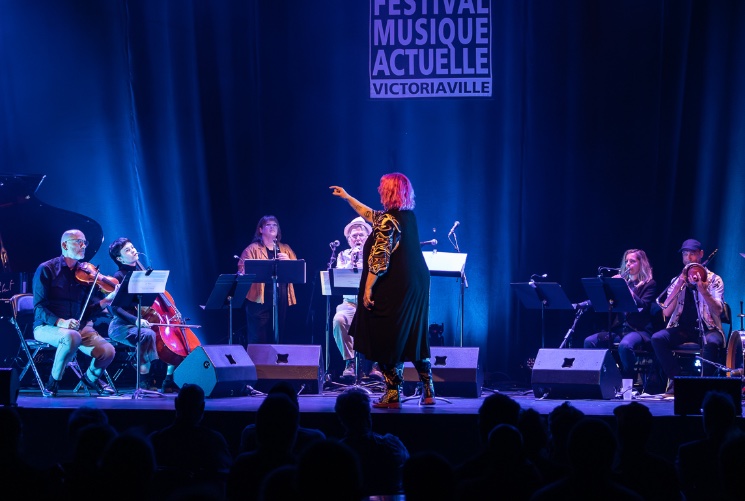
United by their past collaborations with legendary Canadian poet and oral sound artist Paul Dutton, Toronto based drummer Joe Sorbara and German pianist Matthias Mainz rallied a Transatlantic ensemble of improvisers to pay tribute to the great artist's influence. The presentation of this homage to Dutton was complicated and easily enhanced by the participation of Paul Dutton himself. Having retired from touring back in 2017, this return saw the writer/performer in fine form joined by fellow vocal artists Christine Duncan and Laura Swankey for a concert that put the play of language front and centre. A sextet of musicians created a sturdy but spacious framework around each piece, the bulk composed by Sorbara, Mainz and Duncan, while Duncan also served as conductor for her contributions. Appropriate to Dutton's trickster history, the concert highlighted fun over momentousness.
Fred Frith Trio / Heike Liss / Susana Santos Silva
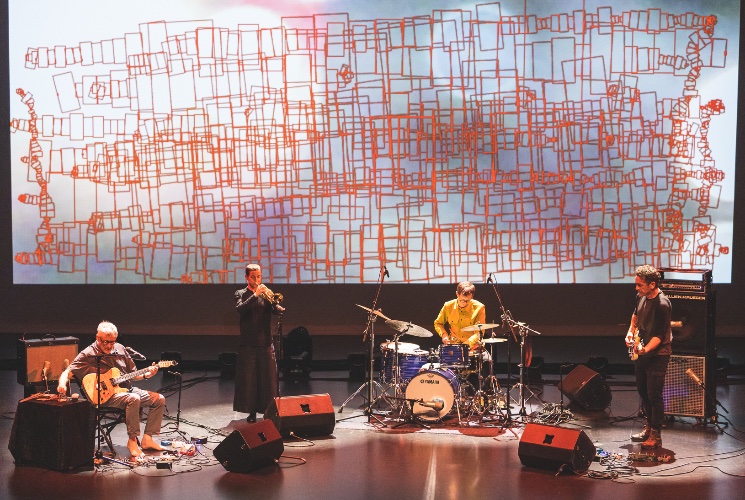
From the first frames of video artist Heike Liss's interactive backdrop, this quartet found a flow it never lost for the duration of the performance. FIMAV godfather and guitar alchemist Fred Frith continued to find gold in his strings, leading his current trio, now with a decade of accumulated experience, through waves of powerful melody and calm stretches of ambient beauty. Filling out the ranks was Portuguese trumpet player Susana Santos Silva, whose play provided both accent and rudder at various intervals. As Liss layered moving landscapes presented as a kind of naturally occurring abstract art, enhanced by live drawings overtop, it provided both enhancement and focus for what was already a sublime experience.
May 20
Lori Freedman
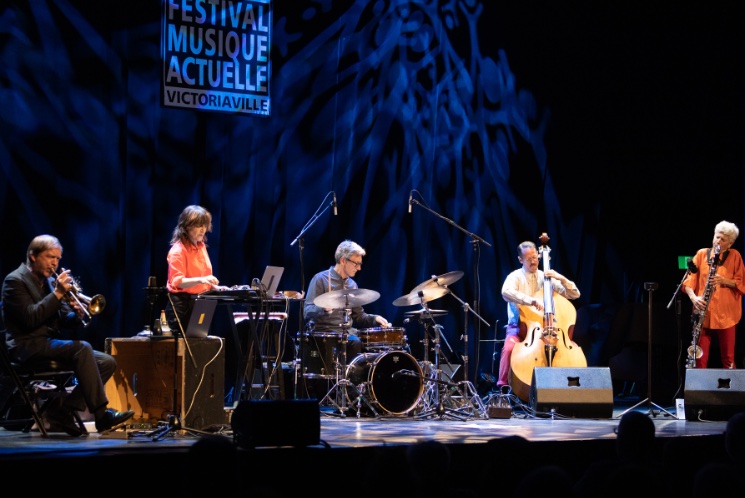
Drawn together by concurrent residencies in Germany, Montreal clarinetist and festival regular Lori Freedman assembled this quintet of improvisers back in 2019, playing a few shows before being derailed by COVID. In their first North American show, the group displayed a studied and at times nearly psychic approach to free play. Developing most pieces with a kind of hit-and-run precision, Andrea Parkins, here on electronics, was a key catalyst in the tempo and density of sound, offering pointillist tones or washes of sound to motivate interaction by drummer Yorgos Dimitriadis and trumpet player Axel Dörner. Axel Dörner's presence was key in the second piece that featured a slow, deliberate study of breath in a drone, aided especially by bassist Christopher A. Williams, presented as a meditative and ever-evolving ebb and flow. The careful creativity and stellar results proved the adage that improvisation can often be the best form of composition.
Elliott Sharp / Colin Stetson / Billy Martin / Payton MacDonald
Described on their Bandcamp page as "dronecore jazz metal," Void Patrol is a newly minted quartet of fellow travellers whose paths cross lightly only to be fused by percussionist Payton MacDonald. Colin Stetson proved most fluid in his interaction, delivering his trademark flow of saxophone that was often the engine of each piece. Elliott Sharp flirted with a wide array of guitar attacks, finding grit in the surfaces to create tension and texture. Billy Martin's energy was split between atmospheric percussion and at his kit where his jazz/funk rhythms made slightly unexpected timekeepers. A slightly unbalanced sound mix unfortunately buried MacDonald's marimba at times, as well as swallowing Sharp's less forceful guitar moments. The group's meeting points would often arrive from peculiar angles, seeming to strain against synthesis in favour of finding the most interesting route to their common destination, but once there and locked in the resulting energy was unequivocal.
May 21
FUJI||||||||||TA / EYE
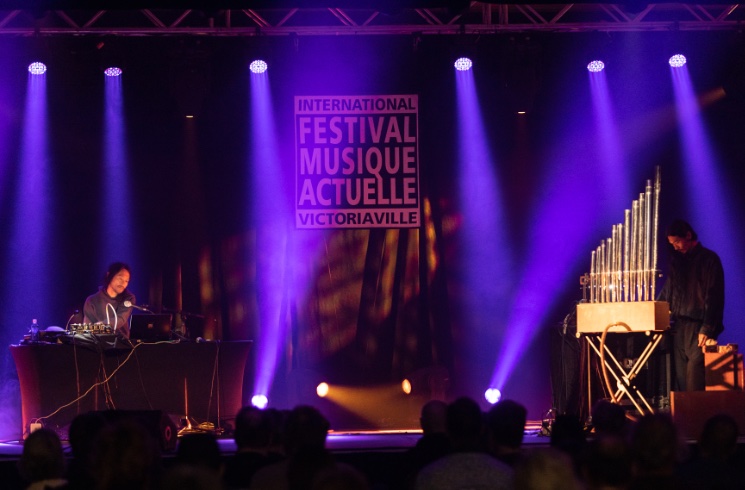
A very noisy start to the closing day of shows featured crowd favourite Tetsuo Yamtsuka, a.k.a. EYE of seminal outfits like Naked City and the Boredoms. He was joined by Yosuke Fujita in a duel of tones and frequencies that emitted from a near-dark stage that often made the origin of sounds difficult to parse. Emerging from an extended rumbling ambient storm of electronics and synthesizer, eventually the EYE just had to EYE, erupting into a trademark vocal detonation leaving trails of software echo and digital feedback in his wake. The noise from stage right was more measured, featuring Fujita's self-constructed pipe organ played without keyboard but rather a handheld air pump. The highlight of the show came during a collaborative vocal section, both artists slowly altering and mixing their voices in a kind of post-apocalyptic choir, pipe organ dimly glittering to enhance the effect.
Nina Garcia / Arnaud Rivière
Of the four noise/electroacoustic concerts presented during this year's festival, this French duo's performance rose to the top of the heap, leaving a trail of ringing ears in its wake. Eschewing the strategy of slow builds, the duo screamed out of the gate with a wall of feedback and frequencies. Rivière's work station was crammed with objects, antennae, turntables, contact mics and metal rods, all of which he used to find strangely subtle gaps and seams of sound in what could have just been white noise. Garcia's punk spirit was in full display as soon as she walked on stage and retrieved her guitar, which was lying unceremoniously flat on the ground. For over an hour, they sculpted new shapes in noise, building with gradual ferocity and evident cooperation. Key moments of quiet were few and brief, but they certainly added a kind of negative punctuation to reset for each new brutal paragraph.
John Zorn
There would be few more fitting closing statements for this year's festival and to Michel Levasseur's tenure as artistic director than this triple shot of Zorn. Up first was the acoustic trio led by Brian Marsella on piano playing a cross section of bebop and cool jazz-inspired pieces with a Zorn quarter twist to refresh the forms. Bassist Jorge Roeder was the solid centre between Marsella and drummer Ches Smith's more spirited ranging. Hints of Bill Evans and even Vince Guaraldi peeked through the frantic drum fills at times, allowing hints of nostalgia into this thoroughly modern moment.
Next up, the electric trio was signature Zorn: John Medeski on the organ, Matt Hollenberg on guitar and Kenny Grobowski on drums running amok in the part of the Zorn universe where '50s/'60s soul jazz and '80s thrash metal somehow coexist.
Finally, Zorn himself took the stage to lead his New Masada Quartet, a refresh of his '90s classic lineup featuring the return of Jorge Roeder on bass, Kenny Wollesen on drums and wunderkind guitarist Julian Lage stepping into Dave Douglas's vacant trumpet spot. Though a new beast, the quartet kept on point, breathing vibrancy into Zorn's exploration of Jewish themes. The quality Zorn brings, both to his compositions and to the musicians he gathers, is an undeniable assurance that both audience and music are in expert hands.
The first came with the loss of Colisée Desjardins, one of the festival's key venues and home to nearly half of its concerts. The second came with the announced retirement of Michel Levasseur, the festival's founder and artistic director. Anyone who has attended FIMAV is familiar with Levasseur, who personally introduces every performance with the modest good humour of someone who is genuinely a fan of new musical experiences.
The issue of venues was resolved by the festival taking full advantage of the two main theatre spaces in the city's Le Carré 150 and turning a hotel conference room into a music venue without missing a beat or sacrificing any of the festival's programming or integrity. The issue of the festival's operational future remains uncertain, with Levasseur's wife and administrative director, Joane Vézina, joining him in retirement. The "family affair" aspect of the event always balanced out its grandeur, giving it a human touch and easy feeling that seemed unlikely given the stature of its performers.
Though the melancholic mood touched performances, the lineup was stellar as usual. Appropriately enough, longtime festival titans Fred Frith and John Zorn both made appearances. The balance of veteran performers and relative newcomers, of local talent and international guests, remained a hallmark.
May 18
PoiL Ueda

French quartet PoiL play a brand of progressive rock that incorporates metal gestures and technical dexterity, tempering their impressive heaviness with multidimensional articulation. The group recently added another dimension via collaboration with Japanese singer and satsuma-biwa player Junko Ueda. Their festival opening concert featured a cycle of epic 13th century Japanese stories of samurai and wartime family battles. With Junko's guidance and featured vocal presence, the group threaded their operatic aggression with delicate acculturation of Eastern sounds and modes. Notably, keyboardist Antoine Arnera not only carried much of the melodic weight of the pieces, but also featured an array of tones that bridged the distance between traditions. It was a blistering start to the festival, and one that would be difficult to top.
Ikue Mori

Festival veteran Ikue Mori brought her new suite of compositions entitled Tracing the Magic, released last June on John Zorn's Tzadik label, to the stage in Victoriaville. More boldly musical than in previous iterations, Ikue's digital contributions were rounded out by a strong team of veteran players, particularly vocal improviser Charmaine Lee who early on combined with Ikue for an ASMR-like sequence of quiet ticks and whispers. As the performance progressed however, it seemed like the compositions were imposing more limitations than opening possibilities. While versatile woodwind player Ned Rothenberg managed clever and affecting interplay with Lee and drummer Ches Smith, pianist Sylvie Courvoisier never seemed to find a seam to slip into, and David Watson spent long stretches quietly holding rather than playing his bagpipes. It was a performance dotted with fine moments, but never really found the magic.
May 19
Emilie Škrijelj / Tom Malmendier

If seeing Emilie Škrijelj's accordion sitting on the stage created a kind of Chekov's Gun expectation, this was the kind of show where that gun would be used to crack walnuts in the third act. Starting with a loop-laden suite of noises courtesy of turntable and electronics, Škrijelj and drummer Tom Malmendier maintained a pocket of tension and detail that found them creatively locked together within a constantly surprising mechanism. By the time the accordion was retrieved from its resting place, it became clear that, instead of polka standards, the instrument would be used as a kind of resonant chamber and percussive surface channelled through more electronics that unlocked many hidden avenues of tone and rhythm. Škrijelj and Malmendier's great strength lies in their easily shared musical grammar, dissolving the tendency of lead and support in favour of truly inspired co-creation.
Joe Sorbara / Matthias Mainz

United by their past collaborations with legendary Canadian poet and oral sound artist Paul Dutton, Toronto based drummer Joe Sorbara and German pianist Matthias Mainz rallied a Transatlantic ensemble of improvisers to pay tribute to the great artist's influence. The presentation of this homage to Dutton was complicated and easily enhanced by the participation of Paul Dutton himself. Having retired from touring back in 2017, this return saw the writer/performer in fine form joined by fellow vocal artists Christine Duncan and Laura Swankey for a concert that put the play of language front and centre. A sextet of musicians created a sturdy but spacious framework around each piece, the bulk composed by Sorbara, Mainz and Duncan, while Duncan also served as conductor for her contributions. Appropriate to Dutton's trickster history, the concert highlighted fun over momentousness.
Fred Frith Trio / Heike Liss / Susana Santos Silva

From the first frames of video artist Heike Liss's interactive backdrop, this quartet found a flow it never lost for the duration of the performance. FIMAV godfather and guitar alchemist Fred Frith continued to find gold in his strings, leading his current trio, now with a decade of accumulated experience, through waves of powerful melody and calm stretches of ambient beauty. Filling out the ranks was Portuguese trumpet player Susana Santos Silva, whose play provided both accent and rudder at various intervals. As Liss layered moving landscapes presented as a kind of naturally occurring abstract art, enhanced by live drawings overtop, it provided both enhancement and focus for what was already a sublime experience.
May 20
Lori Freedman

Drawn together by concurrent residencies in Germany, Montreal clarinetist and festival regular Lori Freedman assembled this quintet of improvisers back in 2019, playing a few shows before being derailed by COVID. In their first North American show, the group displayed a studied and at times nearly psychic approach to free play. Developing most pieces with a kind of hit-and-run precision, Andrea Parkins, here on electronics, was a key catalyst in the tempo and density of sound, offering pointillist tones or washes of sound to motivate interaction by drummer Yorgos Dimitriadis and trumpet player Axel Dörner. Axel Dörner's presence was key in the second piece that featured a slow, deliberate study of breath in a drone, aided especially by bassist Christopher A. Williams, presented as a meditative and ever-evolving ebb and flow. The careful creativity and stellar results proved the adage that improvisation can often be the best form of composition.
Elliott Sharp / Colin Stetson / Billy Martin / Payton MacDonald
Described on their Bandcamp page as "dronecore jazz metal," Void Patrol is a newly minted quartet of fellow travellers whose paths cross lightly only to be fused by percussionist Payton MacDonald. Colin Stetson proved most fluid in his interaction, delivering his trademark flow of saxophone that was often the engine of each piece. Elliott Sharp flirted with a wide array of guitar attacks, finding grit in the surfaces to create tension and texture. Billy Martin's energy was split between atmospheric percussion and at his kit where his jazz/funk rhythms made slightly unexpected timekeepers. A slightly unbalanced sound mix unfortunately buried MacDonald's marimba at times, as well as swallowing Sharp's less forceful guitar moments. The group's meeting points would often arrive from peculiar angles, seeming to strain against synthesis in favour of finding the most interesting route to their common destination, but once there and locked in the resulting energy was unequivocal.
May 21
FUJI||||||||||TA / EYE

A very noisy start to the closing day of shows featured crowd favourite Tetsuo Yamtsuka, a.k.a. EYE of seminal outfits like Naked City and the Boredoms. He was joined by Yosuke Fujita in a duel of tones and frequencies that emitted from a near-dark stage that often made the origin of sounds difficult to parse. Emerging from an extended rumbling ambient storm of electronics and synthesizer, eventually the EYE just had to EYE, erupting into a trademark vocal detonation leaving trails of software echo and digital feedback in his wake. The noise from stage right was more measured, featuring Fujita's self-constructed pipe organ played without keyboard but rather a handheld air pump. The highlight of the show came during a collaborative vocal section, both artists slowly altering and mixing their voices in a kind of post-apocalyptic choir, pipe organ dimly glittering to enhance the effect.
Nina Garcia / Arnaud Rivière
Of the four noise/electroacoustic concerts presented during this year's festival, this French duo's performance rose to the top of the heap, leaving a trail of ringing ears in its wake. Eschewing the strategy of slow builds, the duo screamed out of the gate with a wall of feedback and frequencies. Rivière's work station was crammed with objects, antennae, turntables, contact mics and metal rods, all of which he used to find strangely subtle gaps and seams of sound in what could have just been white noise. Garcia's punk spirit was in full display as soon as she walked on stage and retrieved her guitar, which was lying unceremoniously flat on the ground. For over an hour, they sculpted new shapes in noise, building with gradual ferocity and evident cooperation. Key moments of quiet were few and brief, but they certainly added a kind of negative punctuation to reset for each new brutal paragraph.
John Zorn
There would be few more fitting closing statements for this year's festival and to Michel Levasseur's tenure as artistic director than this triple shot of Zorn. Up first was the acoustic trio led by Brian Marsella on piano playing a cross section of bebop and cool jazz-inspired pieces with a Zorn quarter twist to refresh the forms. Bassist Jorge Roeder was the solid centre between Marsella and drummer Ches Smith's more spirited ranging. Hints of Bill Evans and even Vince Guaraldi peeked through the frantic drum fills at times, allowing hints of nostalgia into this thoroughly modern moment.
Next up, the electric trio was signature Zorn: John Medeski on the organ, Matt Hollenberg on guitar and Kenny Grobowski on drums running amok in the part of the Zorn universe where '50s/'60s soul jazz and '80s thrash metal somehow coexist.
Finally, Zorn himself took the stage to lead his New Masada Quartet, a refresh of his '90s classic lineup featuring the return of Jorge Roeder on bass, Kenny Wollesen on drums and wunderkind guitarist Julian Lage stepping into Dave Douglas's vacant trumpet spot. Though a new beast, the quartet kept on point, breathing vibrancy into Zorn's exploration of Jewish themes. The quality Zorn brings, both to his compositions and to the musicians he gathers, is an undeniable assurance that both audience and music are in expert hands.
